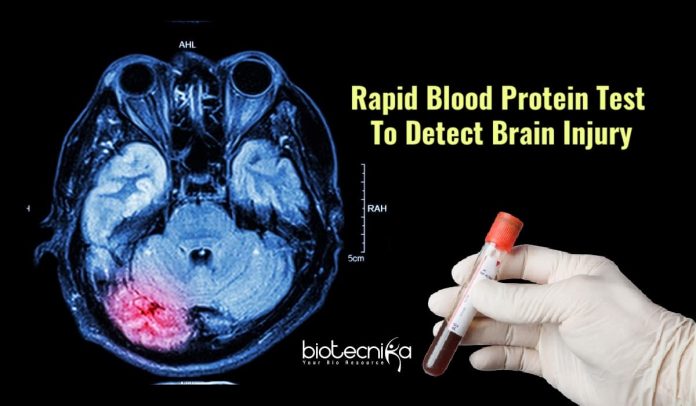Blood Protein Test For Detecting Brain Injury
Researchers in a breakthrough study found that a blood protein test could detect the severity of head trauma within 15 minutes. The Journal of Neurotrauma published the new research.
David Okonkwo, professor of neurological surgery at the University of Pittsburgh School of Medicine and director of the Neurotrauma Clinical Trials Center at UPMC, advanced the development of a point-of-care testing device designed to help clinicians assess traumatic brain-injury (TBI) in minutes by showing that glial fibrillary acidic protein (GFAP) can accurately determine the severity of a brain-injury” through a blood test.
A hand-held device with a cartri traumatic brain-injury that would measure GFAP in the blood of a patient is included in the vision for the rapid test. Researchers at Abbott Laboratories have yet to standardize the test for the i-STAT device, commonly used by healthcare and military providers around the globe to carry out several blood tests within minutes. A patient’s GFAP level can be revealed through the blood test.
Okonkwo said the test could eliminate any presumptions while diagnosing TBIs and determine whether a patient requires further treatment.
The test can help healthcare providers have the critical information they need within
minutes to treat each patient’s brain-injury, whether they are testing a patient in a small rural hospital with limited resources or testing a soldier injured in combat.Researchers enrolled 1,497 people who sought treatment at one of the 18 Transforming Research and Clinical Knowledge in TBI level 1 trauma centers in the country for more than four years for this study, which was expanded upon previous GFAP findings.
Whether a patient requires a head computed tomography scan (CT) scan within 12 hours of mild TBI is determined using GFAP, a Food and Drug Administration-approved marker. Blood tests involving GFAP were being studied by scientists for years. A similar protein called S100B is also being studied by scientists.
In response to specific injuries like TBI, both the proteins are released into the bloodstream. But the new research shows that GFAP is a more efficient TBI diagnostic marker than S100B.
The findings are very promising since the protein can determine the severity of TBI through a simple blood test, and a device commonly used in urgent care facilities, doctors’ offices, and hospitals can be used for the same.
To analyze the blood for the GFAP protein, all they have to do is add an extra cartridge to the device.
The device can save nearly USD 100 million in medical expenses annually by decreasing the unnecessary CT scans by 20 percent or more.






























